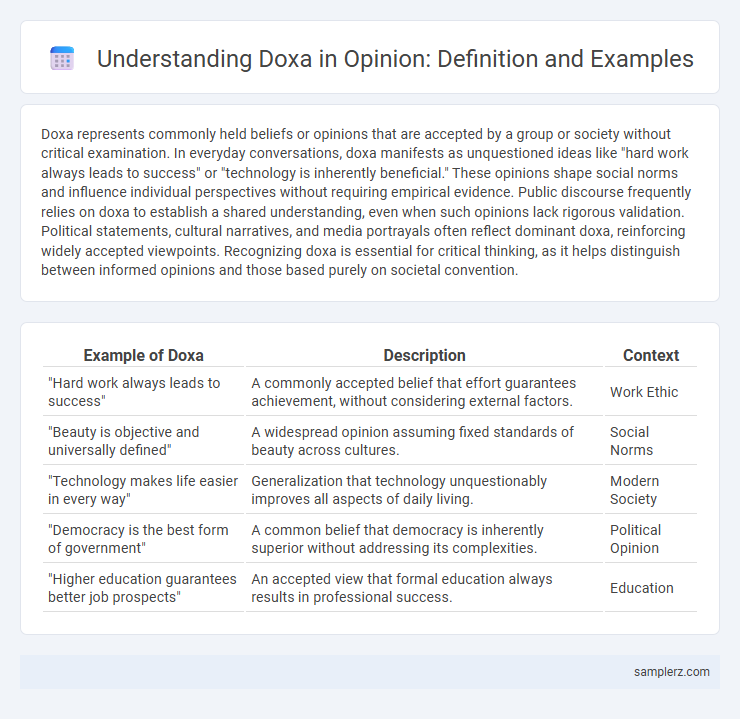Doxa represents commonly held beliefs or opinions that are accepted by a group or society without critical examination. In everyday conversations, doxa manifests as unquestioned ideas like "hard work always leads to success" or "technology is inherently beneficial." These opinions shape social norms and influence individual perspectives without requiring empirical evidence. Public discourse frequently relies on doxa to establish a shared understanding, even when such opinions lack rigorous validation. Political statements, cultural narratives, and media portrayals often reflect dominant doxa, reinforcing widely accepted viewpoints. Recognizing doxa is essential for critical thinking, as it helps distinguish between informed opinions and those based purely on societal convention.
Table of Comparison
| Example of Doxa | Description | Context |
|---|---|---|
| "Hard work always leads to success" | A commonly accepted belief that effort guarantees achievement, without considering external factors. | Work Ethic |
| "Beauty is objective and universally defined" | A widespread opinion assuming fixed standards of beauty across cultures. | Social Norms |
| "Technology makes life easier in every way" | Generalization that technology unquestionably improves all aspects of daily living. | Modern Society |
| "Democracy is the best form of government" | A common belief that democracy is inherently superior without addressing its complexities. | Political Opinion |
| "Higher education guarantees better job prospects" | An accepted view that formal education always results in professional success. | Education |
Common Doxa in Everyday Opinions
Common doxa in everyday opinions often reflects widely accepted beliefs without critical examination, such as the assumption that success solely depends on hard work. These prevailing opinions shape social norms and influence decision-making, despite lacking empirical support. Recognizing and questioning common doxa fosters more informed and nuanced perspectives.
How Doxa Shapes Public Opinion
Doxa, or commonly accepted beliefs, profoundly influences public opinion by framing societal norms and values through shared perceptions. These collective assumptions guide individuals' attitudes and decision-making processes, often reinforcing dominant ideologies without critical examination. Consequently, doxa shapes public discourse by establishing what is considered true or acceptable within a community.
Examples of Doxa in Social Debates
Doxa in social debates often manifests as widely accepted beliefs about gender roles, such as the assumption that caregiving is primarily a woman's responsibility. Common perceptions around immigration frequently reveal doxa, with mainstream opinions framing immigrants as economic burdens despite evidence to the contrary. Public discussions on climate change sometimes reflect doxa by minimizing human impact, revealing entrenched societal beliefs that resist scientific consensus.
Challenging Doxa in Mainstream Views
Challenging doxa in mainstream views requires critically examining widely accepted beliefs that shape public opinion without questioning their validity. By deconstructing dominant narratives and presenting alternative perspectives grounded in empirical evidence, individuals expose biases and foster more nuanced discussions. This process disrupts the complacency of doxa, encouraging society to reevaluate and potentially transform entrenched ideological frameworks.
Doxa and Its Role in Shaping Beliefs
Doxa, representing commonly held beliefs and opinions within a society, significantly shapes individual and collective worldviews through prevailing cultural norms and media influence. It operates as an uncritical acceptance of certain truths that guide social behavior and reinforce existing power structures. Understanding doxa is essential for critically examining how societal consensus forms and perpetuates dominant ideologies.
Political Opinions Influenced by Doxa
Political opinions influenced by doxa often reflect widely accepted beliefs within a society, such as the assumption that democracy inherently ensures fairness and equality. These opinions are shaped by dominant narratives perpetuated through media, education, and cultural norms, reinforcing mainstream political ideologies without critical examination. As a result, dissenting voices or alternative perspectives frequently remain marginalized, highlighting the power of doxa in maintaining political consensus.
Unpacking Cultural Doxa in Opinions
Cultural doxa shapes public opinions by embedding widely accepted beliefs without question, influencing perspectives on social norms and values. These implicit assumptions often manifest in opinions about tradition, identity, and morality, reflecting collective unconscious acceptance. Examining cultural doxa reveals how societal narratives limit critical thinking and reinforce dominant ideologies within public discourse.
Doxa vs. Episteme: Opinion or Knowledge?
Doxa represents common opinion shaped by societal beliefs, lacking rigorous evidence or systematic understanding, whereas episteme refers to justified, scientific knowledge grounded in proof and reason. The distinction between doxa and episteme highlights how opinions often stem from cultural assumptions, while episteme demands critical examination and validation. This contrast underlines the importance of discerning between what is widely believed and what is empirically verified in the pursuit of truth.
The Persistence of Doxa in Modern Discourse
The persistence of doxa in modern discourse manifests through widely accepted beliefs that often go unchallenged in public debate, reinforcing societal norms without critical examination. These preconceptions shape political narratives and media framing, limiting the scope of alternative viewpoints by embedding assumed truths in everyday communication. Understanding doxa's role is crucial to fostering more reflective and inclusive dialogues that transcend established opinion boundaries.
Real-Life Scenarios: Doxa in Personal Opinions
Doxa in personal opinions often reflects widely accepted beliefs shaped by cultural norms and social experiences. For instance, many individuals assume that success equates to wealth and status, a doxa reinforced through media and societal expectations. These ingrained perspectives influence everyday decisions and shape collective understanding without critical examination.

example of doxa in opinion Infographic
 samplerz.com
samplerz.com